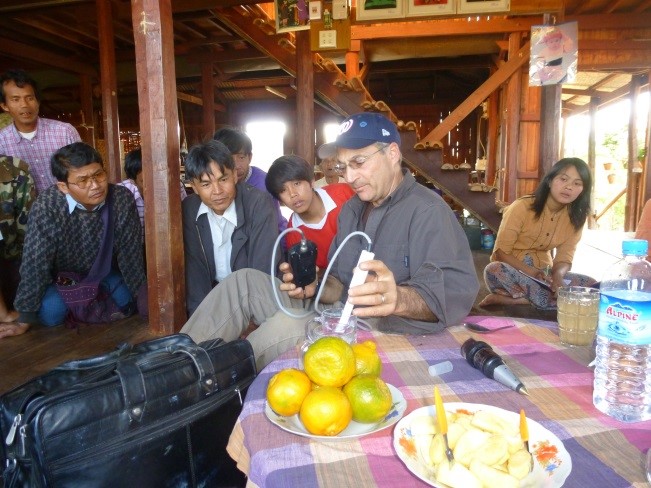
Volunteer Post
Simple technologies, widespread benefits
This article is a contribution to a four-week blog series celebrating 30 years of USAID’s John Ogonowski and Doug Bereuter Farmer-to-Farmer (F2F) Program.
What is technology transfer? How has F2F supported successful technology transfer? What are some of the associated impacts?
These questions have inspired us to reflect on many successful volunteer assignments over the years. Winrock’s Asia F2F field staff offer a few examples:
In Bangladesh, F2F volunteers introduced the California Mastitis Test (CMT) kit to livestock technical agents and service providers to check the presence of mastitis disease in cows. This low-cost, simple technology was not previously available in Bangladesh, so F2F volunteers brought samples of the kit and demonstrated its use during interactive trainings. Subsequently, Bangladeshi service providers — such as BRAC, which supports over 1 million livestock farmers — have imported and introduced the kit to thousands of local experts and dairy farmers. Mr. A Q M Shafiqur Rouf, the Deputy General Manager of the BRAC AI Enterprise, notes,
“For the first time in my life, we are introducing mastitis diagnosis by test kits. It is a very easy solution for a complex problem. Our dairy farmers highly benefit from it!”

In Nepal, F2F volunteers introduced the FAMACHA card, a simple tool that enables rapid detection of parasites on sheep and goats. Dr. Nelson Escobar trained more than 200 individuals on the use of the tool. After the training, the Ministry of Agriculture and Cooperatives instructed government staff to employ the FAMACHA card in projects nationwide. Volunteer Daniel Flaherty likewise conducted training of trainers for extension workers from the Government of Nepal’s Agriculture Food Security Project (AFSP); subsequently, the project purchased 600 FAMACHA cards and trained 250 local service providers to effectively use the tool and offer expanded services to more than 20,000 goat and sheep farmers.

In Myanmar (Burma), volunteer Howard Prussack trained and assisted over 900 women and men from 34 villages, the majority of whom had never before received information or support on agriculture production. He demonstrated techniques to help improve productivity and introduced simple tools such as basic soil tests, magnifying glasses, and insect traps that the farmers had never seen before. In village after village, the farmers were rapt. Staff from the Myanmar Businesses Coalition on AIDS, which supported Prussack on his assignment, explained,
“Howard was just what we asked for, bringing practical solutions to real world problems. This is a program that changes lives!”

There are many other examples of successful technology transfer volunteer assignments and resulting impacts, worldwide. Winrock has implemented F2F since 1991; this is one of the common threads.
We are currently recruiting volunteer experts to participate in technology transfer assignments related to laboratory sciences; seed oil processing; and horticulture, aquaculture, and rice production in several countries in Asia and West Africa. To find out more, visit: https://winrock.org/opportunities
From November 16-December 11, F2F program partners are sharing their knowledge and experience providing technical assistance to farmers, farm groups, agribusinesses, service providers, and other agriculture sector institutions in developing and transitional countries. As aligned with Feed the Future, the U.S. Government’s global hunger and food security initiative, F2F works to support inclusive agriculture sector growth, facilitate private sector engagement in the agriculture sector, enhance development of local capacity and promote climate-smart development. Volunteer assignments address host-led priorities to expand economic growth that increases incomes and improves access to nutritious food. This blog series aims to capture and share this program experience.
Read more articles celebrating 30 years of F2F on Agrilinks: agrilinks.org
